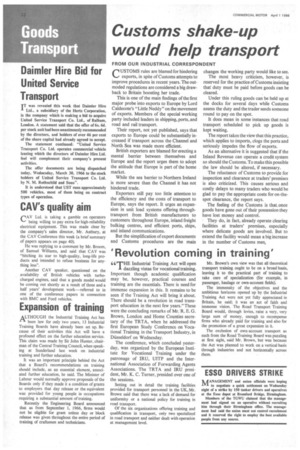Customs shake-up would help transport
Page 24

If you've noticed an error in this article please click here to report it so we can fix it.
FROM OUR INDUSTRIAL CORRESPONDENT
CUSTOMS rules are blamed for hindering IL, exports, in spite of Customs attempts to improve procedures in recent years. The outmoded regulations are considered a big drawback to Britain boosting her trade.
This is one of the main findings of the first major probe into exports to Europe by Lord Caldecote's "Little Neddy" on the movement of exports. Members of the special working party included leaders in shipping, ports, and road and rail transport.
Their report, not yet published, says that exports to Europe could be substantially increased if transport across the Channel and North Sea was made more efficient.
British exporters are blamed for erecting a mental barrier between themselves and Europe and the report urges them to adopt the attitude that Europe is part of the home market.
While the sea barrier to Northern Ireland is more severe than the Channel it has not hindered trade.
Exporters still pay too little attention to the efficiency and the costs of transport to Europe, says the report. It urges an expansion in unit load systems offering throughtransport from British manufacturers to customers throughout Europe, inland freight bulking centres, and efficient ports, ships, and inland communications.
But the simplification of export documents and Customs procedures are the main changes the working party would like to see.
The most heavy criticism, however, is reserved for the practice of Customs insisting that duty must be paid before goods can be cleared.
Under this ruling goods can be held up at the docks for several days while Customs assess the duty and the trader sends someone round to pay on the spot.
It does mean in some instances that road transport scheduled to pick up goods is kept waiting.
The report takes the view that this practice, which applies to imports, clogs the ports and seriously impedes the flow of exports.
As an alternative it is suggested that if the Inland Revenue can operate a credit system so should the Customs. To make this possible the law should be altered, if necessary.
The reluctance of Customs to provide for inspection and clearance at traders' premises is also criticized. This Causes serious and costly delays to many traders who would be glad to pay the appropriate costs for on-thespot clearance, the report says.
The feeling of the Customs is that, once goods have gone out of their possession they have lost money and control.
• They do, in fact, already operate clearing facilities at traders' premises, especially where delicate goods are involved. But to extend the facility would mean a big increase in the number of Customs men,




















































































































